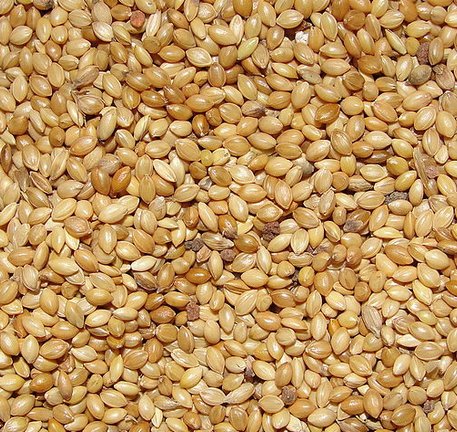Millet

  | Millet in TCM:Explore the properties of Millet according to Chinese
Nutrition and Traditional Chinese Medicine (TCM):
Temperature: cool
Channels: ST, SP, KD
Flavors: astringent, sweet, salty
Tonifies: yin
Special Properties:
clears heat, eliminates toxins, resolves dryness
In terms of Traditional Chinese Medicine (TCM) Millet is known for its ability to tonify yin which builds fluids and moistens dryness, astringes the stomach and intestines[22], promotes urination[22], and alleviates morning sickness[22]. It also helps to clear heat and eliminate toxins.
In general the ancient Chinese medical texts cite that it enters the Stomach, Spleen, and Kidney. The flavor of Millet is cool, and it is considered to be sweet and salty in temperature.
Millet is a diuretic known to strengthen the kidney, as well as being beneficial to the stomach and spleen-pancreas. Millet is particularly alkalizing and known to help balance overly acidic situations. Millet sweetens breath by retarding bacterial growth in the mouth. Millet has a high amino acid (protein) profile and is rich in silicon. Millet is known to help prevent miscarriage and it is an anti-fungal. In fact Millet is considered to be one of the best grains for those with Candida Albicans overgrowth. Millet is "also useful for diarrhea (roast before cooking), vomiting (millet soup or congee), indigestion, and diabetes (HWWF 467)."
Millet can also help to sooth morning sickness - eat in soup or congee regularly. Millet is known as the "queen of all grains", and due to its alkaline forming nature its often cooked with little or no salt. For morning sickness, its optional to add fresh ginger.
For diarrhea roast millet until it becomes aromatic, then eat 1/2 cup 3x per day. For difficult urination or obstructed urinary flow boil tea from millet and add 1/2 teaspoon with brown sugar. For diabetes steam millet with yams and jujube. [22]
Contraindications: Millet is contraindicated for those with signs of very weak digestive functions such as consistently weak stool.
Disclaimer: In accordance with our terms of service, by using this web site you agree that none of the information found on this web site constitutes medical advice. You should always consult your doctor before trying any particular food or herbal remedy to treat disease.
Folk remedies presented on this site are designed to address specifc TCM diagnoses, and are not one-size-fits-all. If you would like to learn more about Traditional Chinese Medicine (TCM) and how it relates to Chinese Nutrition, you can book in a free call with a licensed professional. There is no obligation to purchase.
[CLICK HERE for your free INITIAL CONSULTATION] |

